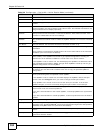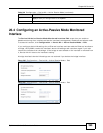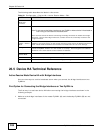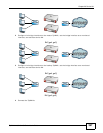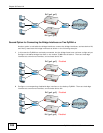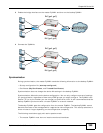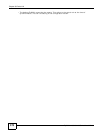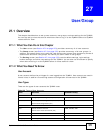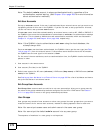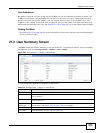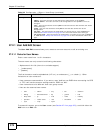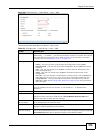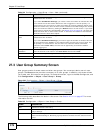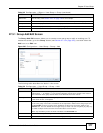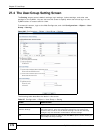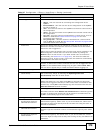
Chapter 27 User/Group
ZyWALL 110/310/1100 Series User’s Guide
372
Note: The default admin account is always authenticated locally, regardless of the
authentication method setting. (See Chapter 32 on page 409 for more information
about authentication methods.)
Ext-User Accounts
Set up an ext-user account if the user is authenticated by an external server and you want to set
up specific policies for this user in the ZyWALL. If you do not want to set up policies for this user,
you do not have to set up an ext-user account.
All ext-user users should be authenticated by an external server, such as AD, LDAP or RADIUS. If
the ZyWALL tries to use the local database to authenticate an ext-user, the authentication attempt
always fails. (This is related to AAA servers and authentication methods, which are discussed in
Chapter 31 on page 400 and Chapter 32 on page 409, respectively.)
Note: If the ZyWALL tries to authenticate an ext-user using the local database, the
attempt always fails.
Once an ext-user user has been authenticated, the ZyWALL tries to get the user type (see Table
132 on page 371) from the external server. If the external server does not have the information,
the ZyWALL sets the user type for this session to User.
For the rest of the user attributes, such as reauthentication time, the ZyWALL checks the following
places, in order.
1 User account in the remote server.
2 User account (Ext-User) in the ZyWALL.
3 Default user account for AD users (ad-users), LDAP users (ldap-users) or RADIUS users (radius-
users) in the ZyWALL.
See Setting up User Attributes in an External Server on page 382 for a list of attributes and how to
set up the attributes in an external server.
Ext-Group-User Accounts
Ext-Group-User accounts work are similar to ext-user accounts but allow you to group users by
the value of the group membership attribute configured for the AD or LDAP server. See Section
31.2.1 on page 403 for more on the group membership attribute.
User Groups
User groups may consist of user accounts or other user groups. Use user groups when you want to
create the same rule for several user accounts, instead of creating separate rules for each one.
Note: You cannot put access users and admin users in the same user group.
Note: You cannot put the default admin account into any user group.
The sequence of members in a user group is not important.



